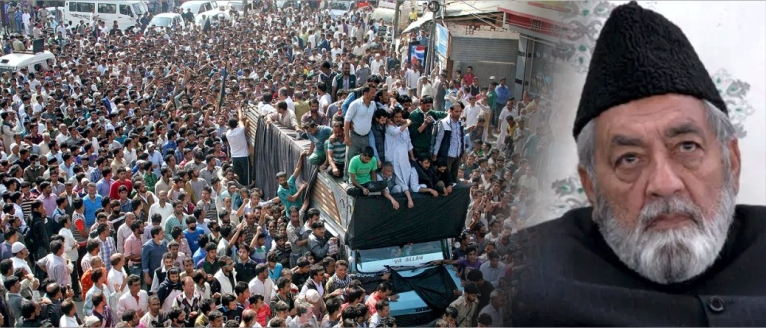As we observe the 10th death anniversary of his passing, we pay our deepest respects to the soul of Moulana Iftikhar Hussain Ansari and salute the sacred soil that cradles his remains. His sacrifices and the storms he weathered on behalf of the Shia community in Kashmir will never be forgotten.
By Muzammil Malik
As we mark the 10th death anniversary of Hujjat-ul-Islam-Wal-Muslimeen, Marhoom Moulana Iftikhar Hussain Ansari (r.a), we find ourselves reflecting on the life and legacy of a leader whose impact continues to resonate throughout Kashmir and beyond. Born on April 26, 1942, in the revered Khanqah-e-Sokhta, Nawakadal, Srinagar, Moulana Iftikhar Ansari was not just a man but a movement—an embodiment of resilience, leadership, and unwavering commitment to his faith and community.
Moulana Iftikhar Hussain Ansari was a man of many facets. A revolutionary leader, a renowned religious scholar, a fiery orator, and a internationally recognized politician, he was a stalwart defender of Shia beliefs and the rights of Shia Muslims in Jammu and Kashmir. His contributions to the religious, social, and political life of Kashmir are unparalleled, marking him as a pioneer of Shia reformation in India. In a time fraught with challenges, when identifying as a Shia Muslim was an act of courage, Ansari stood tall, fearlessly advocating for the religious and political rights of his community.
His activism was not without peril. Throughout his life, Moulana Iftikhar Hussain Ansari faced multiple assassination attempts by terrorists, each one a stark reminder of the dangerous path he had chosen. Yet, he survived, his spirituality and miraculous escapes reinforcing his image as a leader chosen by destiny. His survival against the odds only deepened the bond between him and the people who saw in him a beacon of hope and a defender of their faith.
The 30th of September 2014 marked a dark day for the Shia community and for all who admired him. On that day, Moulana Iftikhar Hussain Ansari left this world, leaving behind a void that still feels impossible to fill. Such leaders are not born every day, they are rare phenomena whose absence leaves an irreplaceable chasm in the hearts of those who followed them. The loss of Ansari was not just the loss of a father to his family but the loss of a father figure to an entire community.
Ansari’s contributions to the Shia Muslim community and to the broader Kashmiri society were immense. He played a pivotal role in uniting Kashmiri Shia Muslims and promoting the teachings of Imam Hussain (a.s). His efforts to maintain and organize the Muharram processions (Juloos e Aza) and Ashura gatherings gained widespread attention and support from Shia communities worldwide. His dedication to his people was absolute; he always placed their needs above his own, working tirelessly for them until his final days.
One of the most remarkable moments in Ansari’s life was his decision to turn down a prestigious offer to become India’s High Commissioner to Iran during the 1980s. When offered the post by the late Prime Minister of India, Ansari declined, stating that he wanted to be “the ambassador of the Islamic revolution in India and the representative of the ideology of Imam Khomeini.” This decision was met with great respect from Imam Khomeini, who appointed Ansari as his representative in India—a role later endorsed by prominent Shia religious authorities, including Ayatollah Syed Ali Sistani. This decision underscored Ansari’s deep commitment to his faith and his desire to serve his community above all else.
Beyond his religious and political advocacy, Ansari’s legacy includes significant contributions to education and social welfare. He established Jamia Imam Sadiq (a.s) in Shadipora Sumbal, providing free religious and promotional education to students. Additionally, he founded religious schools called “Marif ul Aloom” in various villages and towns, where thousands of children received free religious education. His efforts ensured that the next generation would be equipped with the knowledge and values necessary to continue the work he had begun.
In the socio-political landscape of Jammu and Kashmir, the Shia Muslim community has long faced unique challenges in preserving its identity and advocating for its rights. Ansari recognized the importance of political representation as a central pillar in the community’s quest for modernization, development, and progress. His leadership was instrumental in ensuring that the Shia Muslim community had a voice in the political discourse of Jammu and Kashmir.
Ansari’s humanitarian efforts were not confined to education. He played a critical role in the redevelopment and reestablishment of the Markazi Imambargah Zadibal Srinagar after it was destroyed by fringe elements. His tireless efforts and personal sacrifices, including selling his own property, ensured that the dignity and honor of the community remained intact. He also stepped in to rescue the Imam Hussain (a.s) Hospital from financial troubles, a selfless act that saved the institution from seizure and preserved its mission of serving the community.
The annual Majalis e Aza in Muharram, particularly the Shaam-e-Gareeba, held a special place in Ansari’s heart and were deeply cherished by the entire community. The loss of Ansari has left an immeasurable void, but his memory remains a cherished dream for those who knew him and for the generations that have come to know him through his legacy.
As we observe the 10th death anniversary of his passing, we pay our deepest respects to the soul of Moulana Iftikhar Hussain Ansari and salute the sacred soil that cradles his remains. His sacrifices and the storms he weathered on behalf of the Shia community in Kashmir will never be forgotten. His presence will continue to reside in our hearts, guiding us until the Day of Judgment. The nation remains forever indebted to this extraordinary leader, His legacy will forever resonate in our hearts and minds…(WTNS)



